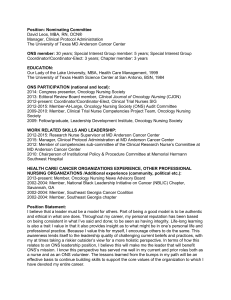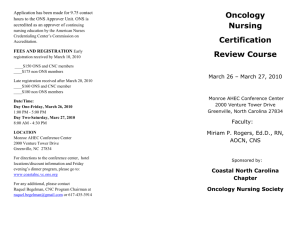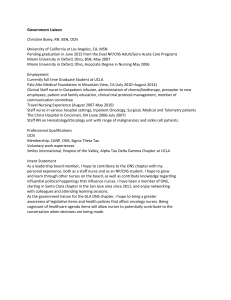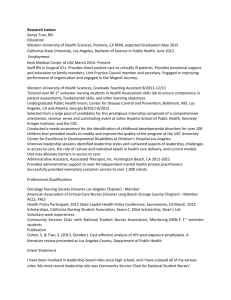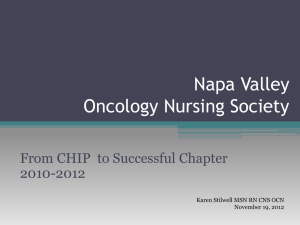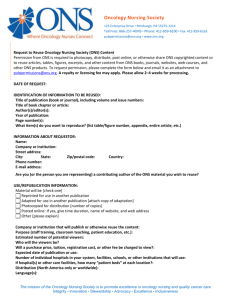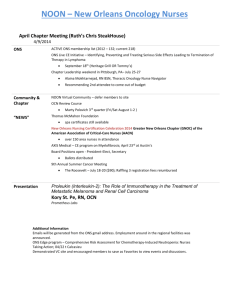Position: Secretary Marcelle Kaplan, MS, RN, AOCN®, CBCN
advertisement
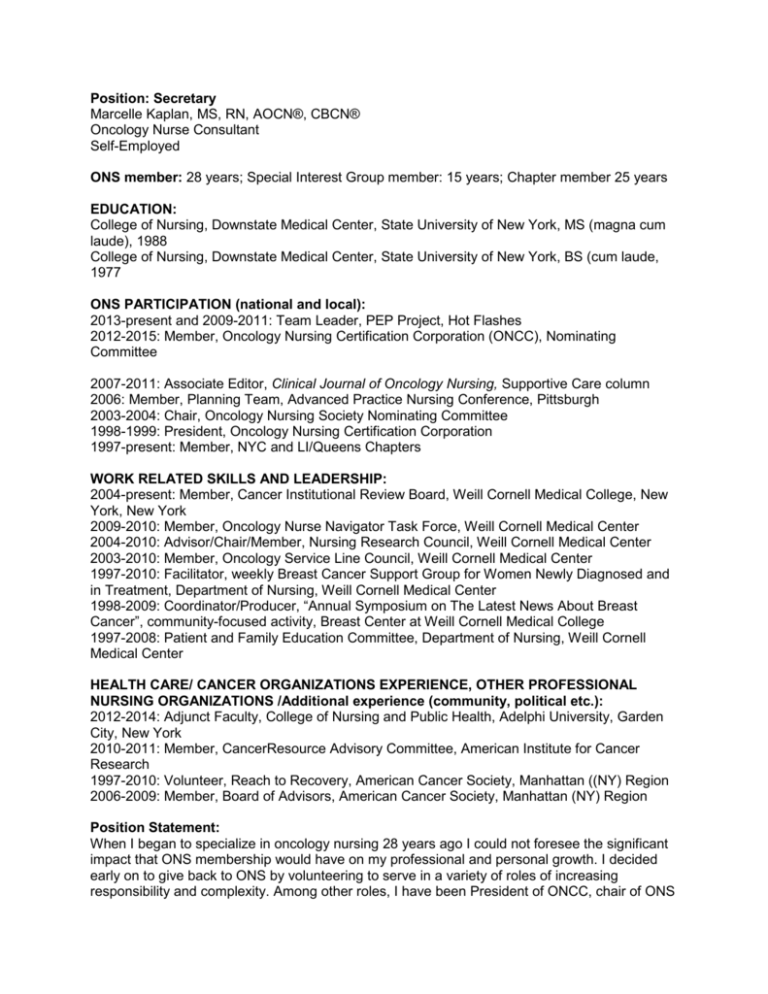
Position: Secretary Marcelle Kaplan, MS, RN, AOCN®, CBCN® Oncology Nurse Consultant Self-Employed ONS member: 28 years; Special Interest Group member: 15 years; Chapter member 25 years EDUCATION: College of Nursing, Downstate Medical Center, State University of New York, MS (magna cum laude), 1988 College of Nursing, Downstate Medical Center, State University of New York, BS (cum laude, 1977 ONS PARTICIPATION (national and local): 2013-present and 2009-2011: Team Leader, PEP Project, Hot Flashes 2012-2015: Member, Oncology Nursing Certification Corporation (ONCC), Nominating Committee 2007-2011: Associate Editor, Clinical Journal of Oncology Nursing, Supportive Care column 2006: Member, Planning Team, Advanced Practice Nursing Conference, Pittsburgh 2003-2004: Chair, Oncology Nursing Society Nominating Committee 1998-1999: President, Oncology Nursing Certification Corporation 1997-present: Member, NYC and LI/Queens Chapters WORK RELATED SKILLS AND LEADERSHIP: 2004-present: Member, Cancer Institutional Review Board, Weill Cornell Medical College, New York, New York 2009-2010: Member, Oncology Nurse Navigator Task Force, Weill Cornell Medical Center 2004-2010: Advisor/Chair/Member, Nursing Research Council, Weill Cornell Medical Center 2003-2010: Member, Oncology Service Line Council, Weill Cornell Medical Center 1997-2010: Facilitator, weekly Breast Cancer Support Group for Women Newly Diagnosed and in Treatment, Department of Nursing, Weill Cornell Medical Center 1998-2009: Coordinator/Producer, “Annual Symposium on The Latest News About Breast Cancer”, community-focused activity, Breast Center at Weill Cornell Medical College 1997-2008: Patient and Family Education Committee, Department of Nursing, Weill Cornell Medical Center HEALTH CARE/ CANCER ORGANIZATIONS EXPERIENCE, OTHER PROFESSIONAL NURSING ORGANIZATIONS /Additional experience (community, political etc.): 2012-2014: Adjunct Faculty, College of Nursing and Public Health, Adelphi University, Garden City, New York 2010-2011: Member, CancerResource Advisory Committee, American Institute for Cancer Research 1997-2010: Volunteer, Reach to Recovery, American Cancer Society, Manhattan ((NY) Region 2006-2009: Member, Board of Advisors, American Cancer Society, Manhattan (NY) Region Position Statement: When I began to specialize in oncology nursing 28 years ago I could not foresee the significant impact that ONS membership would have on my professional and personal growth. I decided early on to give back to ONS by volunteering to serve in a variety of roles of increasing responsibility and complexity. Among other roles, I have been President of ONCC, chair of ONS Nominating Committee, Associate Editor of CJON, editor of 2 editions of "Understanding and Managing Oncologic Emergencies: A Resource for Nurses", author of multiple book chapters, and I currently serve as Team Leader of the PEP project on Hot Flashes. In my workplace, I implemented a variety of programs and processes inspired by ONS. Over the years, I have been fortunate to have been exposed to many mentoring opportunities and wonderful nurse leader role models through ONS participation. Through these experiences I feel that I have gained the leadership skills and confidence to be able to fulfill the role of ONS Secretary. I am comfortable with details and am able to handle multiple concurrent tasks in a timely manner. I would consider it an honor to serve the ONS in the capacity of Secretary of the Board. Chose two of the ONS Core Values and discuss how you have actualized them in your leadership experiences. Innovation: In my role as Breast Oncology Clinical Nurse Specialist in a 900-bed teaching hospital, I was obliged to respond to advances in breast cancer surgical practices, including reduced length of stay, with innovative methods to provide comprehensive education to patients and community members, all without any dedicated budget. I applied for grant funding to create professionally produced patient education materials in various media, and identified cost-free space where I initiated a weekly breast cancer support group. I developed relationships with various hospital departments and the American Cancer Society, and developed and marketed free community programs and health fairs over 13 years. The hospital received much recognition from these activities and I had many wonderful experiences. Excellence: My contributions to the goal of excellence in oncology nursing center on my volunteer leadership activities within ONS and ONCC. I am Team Leader for the ONS (PEP) Hot Flashes project whose evidence-based results have been disseminated in CJON. I have authored ONS online courses and book chapters, and edited the "Oncologic Emergencies" book. I firmly believe certification is a critical step towards demonstrating excellence and have served ONCC as chair of OCN Test Development Committee, President, and member of the breast care certification task force. Reflecting on the mission and vision of ONS, how have you addressed relevant issues to oncology nursing? It is critical to prepare oncology nurses for the future. I am a passionate supporter of oncology nursing certification and believe that attainment of specialty nursing certification gives nurses the confidence and clout to deliver excellent, safe, informed patient care, be competitive in the workplace, and advance up the career ladder. I was able to encourage a patient treated for breast cancer who wished to make a donation to initiate a generous fund to support oncology nursing certification activities for staff nurses. In acknowledgement, I nominated her for the inaugural Pearl Moore Certification Champion award, the first patient to receive it, in the hope that other patients would follow suit. I served on the breast care certification advisory committee and task force that delineated the role and test blueprint for the initial Certified Breast Care Nurse (CBCN) credential that was requested by ONS members. As Associate Editor of CJON for 4 years, responsible for the supportive care column, I reached out to many oncology staff nurses to encourage them to submit topics, mentored them through the writing process, and solicited feedback regarding topics they felt were important to their practice and enabled them to translate their ideas to articles.
